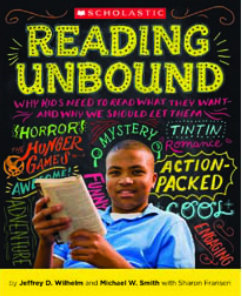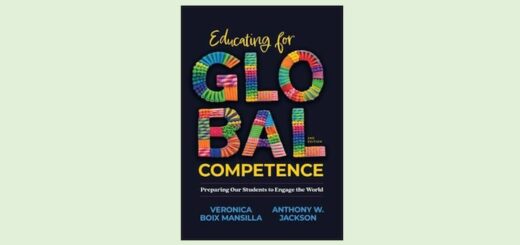What Happens When Kids Choose Their Own Books
Reading Unbound: Why Kids Need to Read What They Want – and Why We Should Let Them
By Jeffrey D. Wilhelm and Michael W. Smith with Sharon Fransen
(Scholastic, 2014 – Learn more)
 Reviewed by Alexa Patterson
Reviewed by Alexa Patterson
As an avid reader with a passion for helping students discover their love for reading, I was instantly intrigued with accomplished authors Jeffery D. Wilhelm and Michael W. Smith’s most recent text, Reading Unbound: Why Kids Need to Read What They Want and Why We Should Let Them.
Growing up in school during the No Child Left Behind era, I was given little to no chance to read texts that I found interesting or took pleasure in reading. We seemed to read the same books that my parents read back in their school days – books that, as most students put it, were “irrelevant and boring.”
 For the foundation of their book, Wilhelm and Smith advocate for teachers to give more attention to the pleasure students experience while reading books they choose themselves. Wilhelm and Smith state,
For the foundation of their book, Wilhelm and Smith advocate for teachers to give more attention to the pleasure students experience while reading books they choose themselves. Wilhelm and Smith state,
The pleasures we’ve received from reading are among the most memorable we’ve experienced. But we don’t think that we’ve given pleasure—either the immediate lived-through pleasure of reading or the deep long-lasting psychological satisfactions reading can deliver—the attention it deserves… (p. 15)
It is important, they say, to give students the time in the classroom to read texts they find gratifying and entertaining.
The 4 pleasures of reading
Wilhelm and Smith begin by examining the nature and variety of four pleasures students gain from reading books they choose themselves and how we as teachers can capitalize on this in our own classrooms. The authors use student transcripts from their own research to demonstrate the four: play, work, intellectual, and social pleasure.
Through the students’ voices, I was able to see how they truly felt about these texts in multiple ways. Whether the students were reading to imagine themselves as the main character of the book (play pleasure), to become a better writer (work pleasure), to discover what they believe in (intellectual pleasure), or to make a connection with friends (social pleasure), they read for a purpose that we as teachers do not always perceive but should more closely examine.
Students love genre fiction
The second part of the book focuses on particular genres that students tend to gravitate toward: romance, vampire novels, horror, dystopian fiction, and fantasy. With each genre, the authors describe the type of pleasure students seemed to experience from reading these books and how we can use the genres in a classroom appropriately.
The authors make the point that teachers should try to see why students are reading each genre and use that as a means to connect in the classroom. Wilhelm and Smith even reference how to tie in such texts and activities to the Common Core standards, which is particularly helpful as we transition to full Common Core implementation.
While reading this text, I began to think back on my own experiences reading in school and found myself agreeing with many of the students interviewed. The most vivid connection that I made was the social pleasure I got from reading, and that still remains true. I usually choose books because I have friends who recommend them to me or I have read reviews in the media. I experience a strong social pleasure in reading and discussing different books with friends. I see this as a crucial aspect of a reading classroom as well.
Reading Unbound: Why Kids Need to Read What They Want and Why We Should Let Them covers a lot of information in a short text. The authors’ use of Jung’s theory of archetypes to argue their thesis can get a little heavy throughout the book, but their overall ideas about using different types of texts that students enjoy reading in the classroom is very powerful.
Many educators can read this book for new ideas for teaching reading in the classroom. However, I would suggest you read Wilhelm and Smith’s previous books as context – they reference many classroom strategies to enhance students’ excitement and engage in reading for pleasure and purpose.
Read another MiddleWeb review of Reading Unbound here.
Alexa Patterson is a graduate student at Mississippi State University in Starkville, MS. She is studying Elementary Education with a concentration in Middle Level Education, as well as working towards her K-12 Reading Endorsement. After completing her degree in the spring of 2014, she hopes to work as a language arts teacher in the middle grades and help students discover their own love for reading.


































